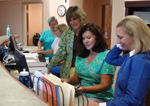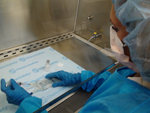|
|
| |
|
| Infusion Center saves time for patients needing IV therapy |
by Mary Helen Yarborough
Public Relations
Drained by the struggle of fighting cancer and the treatments that keep
the disease at bay, Martha Crickenberger is too weak to return to work.
The former schoolteacher, still, is buoyed by a positive outlook and
the intravenous therapy she receives at the MUSC Medicine Infusion
Center. The regular treatments she receives without having to struggle
with parking, waiting and being shuffled from one doctor to another,
has helped her gain enough strength to play tennis on her team in
Summerville.
Carolyn Greene shares a lot in common with Crickenberger, with whom
she’s become accustom over the past few years. Greene, like
Crickenberger, has survived an aggressive form of breast cancer that
has metastasized throughout her body. To look at her—the bright, easy
smile and twinkling eyes—reveals little pain. But the schoolteacher,
who drives down from Georgetown, grows weary when the therapeutic fluid
starts running through her veins.
The two women sit in sleek, ergonomic recliners attached to IVs feeding
them the latest cancer-killing drug. In the small, quiet clinic
overlooking the oaks and palms surrounding the center in the Medical
Arts Building in Mount Pleasant, they compare their experiences and
explain why coming to the Infusion Center has made life much easier to
bare.
“It’s like being a part of a family here,” said Greene. “I actually
look forward to coming here where everything and everybody is in one
place. I don’t have to sit around and wait and I don’t have to go from
one place to another to get treatment.”
The staff in the Infusion Center consists of two registered nurses, a
pharmacist, and a financial counselor to help with insurance or billing
issues.
 Bobbie
Moyer, right, finance coordinator, talks to Bonita Gotbaum, clinical
nurse coordinator, and Lisa Saunders, nurse manager, at the Infusion Center. In the background
are Kelly Brewer, clinical nurse coordinator, and Kelly Kercher,
clinical pharmacist. Bobbie
Moyer, right, finance coordinator, talks to Bonita Gotbaum, clinical
nurse coordinator, and Lisa Saunders, nurse manager, at the Infusion Center. In the background
are Kelly Brewer, clinical nurse coordinator, and Kelly Kercher,
clinical pharmacist.
Greene said the staff tends to everything from addressing a new concern
that arises to administering lifesaving infusion therapy on the spot.
Meanwhile in an adjoining clinic, oncologists are available to step
over to assist or check on patients.
The Infusion Center, previously operated by the Hollings Cancer Center,
had temporarily closed in April and reopened in August under the
Department of Medicine.
While its primary focus had been cancer treatments, the center
provides intravenous medications for a variety of patients needing
infusion therapy, such as patients with osteoporosis who cannot
tolerate oral medications. These patients now can receive the
medications intravenously.
The center also draws on patient needs from Rheumatology, Nephrology,
Endocrinology, Urology, and other specialty care departments. Because
of other medical offices in the building, the center has access to
other services, such as lab, which can be rendered while the patient is
onsite.
“Here, we offer most everything that’s offered at the medical center,
but on a smaller scale,” said Kelly Brewer, R.N., patient coordinator
at the center. “We also are able to offer our services to other
affiliates of MUSC in the community, such as Carolina Family Care.”
 Pharmacist Kelly Kercher prepares an IV prescription in the onsite pharmacy. Pharmacist Kelly Kercher prepares an IV prescription in the onsite pharmacy.
Providing such medical services in specialized, well-equipped clinics
reflects a commitment to patients requiring ongoing care, and a likely
future during which more and expanded services and centers can be
expected throughout the Lowcountry, according to MUSC officials. “We
are aggressively developing clinical sites off the peninsula to improve
quality care,” said John Feussner, M.D., Department of Medicine
chairman. “We’re going to where the patients are as opposed to always
demanding the patients come to us. …And I think that’s wise, and we
plan to do more of it.”
Admittedly, seeing patients in outlying areas is an inconvenience to
the doctors who might have to spend time driving to the off-site
centers and return to clinics on campus throughout the day. “But the
doctors think it’s more important that they are inconvenienced than the
patient being inconvenienced.”
Especially for cancer patients receiving chemotherapy, long waits and
drives can be intolerable. “They’re weak and they feel bad, so going a
long distance doesn’t help them,” Feussner said.
The Mount Pleasant center can treat up to six patients at a time, and
infusion treatment can take only 15 minutes or as long as six hours,
depending on the patient’s condition and treatment plan.
Because of the onsite lab, results can be obtained in a timely manner.
Doctors can call or fax orders directly to the Infusion Center, and the
staff will contact the patient and schedule accordingly and based on
the patient’s needs, said Lisa Saunders, R.N. The onsite pharmacist
reviews all orders, and she also is an added resource to assist any of
the doctors or patients with important medication information.
Along with the level of care and services available, patients enjoy the
patient familiarity, low stress environment and the amount of time
saved by using the centers.
“What makes this appealing is that it is personable and convenient,” said Kelly Kercher, a registered pharmacist.
Some patients drive from Beaufort and Myrtle Beach, and many others
from across town. “There’s no waiting. We have an efficient process,
and the patients say it’s intimate,” Brewer added. “They say we’re like
a family to them. When they come in, we know them and we have the time
to show them we care.”
For information, call 876-2200.
To access a video about the Infusion Center, go to http://www.musc.edu/pr/infusion.mov (for Quick Time); or http://www.musc.edu/pr/infusion.wmv.
Nov. 14, 2008
|
|
|



